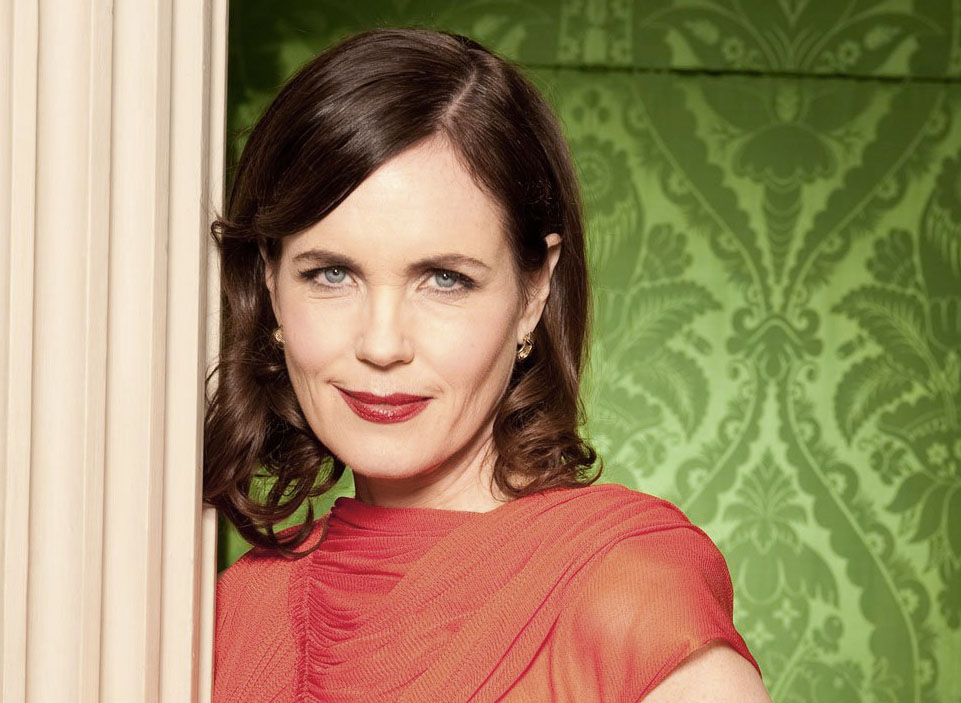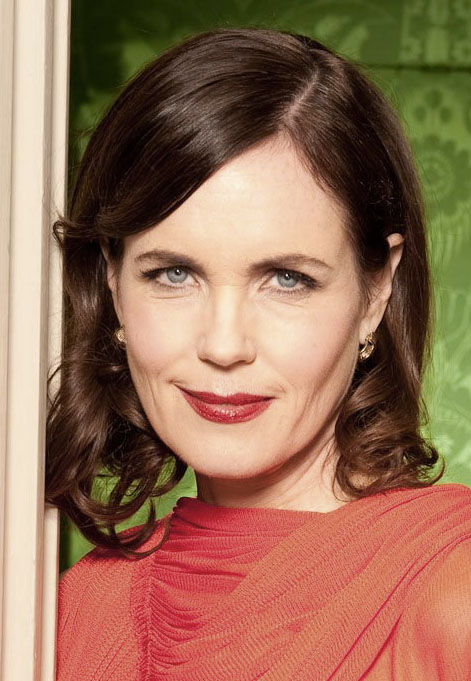 ELIZABETH McGOVERN appears as Veronica in GODS OF CARNAGE which which returns to the Theatre Royal in Bath on 20th January. Best known on television for her award-winning role as Cora Crawley, Countess of Grantham in ITV’s global hit DOWNTON ABBEY, Elizabeth McGovern’s career spans theatre, film, television and music. She made her film debut in Ordinary People directed by Robert Redford in 1980 and received nominations for both an Academy Award and a Golden Globe Award for her second feature film, Ragtime, alongside James Cagney in 1981.
ELIZABETH McGOVERN appears as Veronica in GODS OF CARNAGE which which returns to the Theatre Royal in Bath on 20th January. Best known on television for her award-winning role as Cora Crawley, Countess of Grantham in ITV’s global hit DOWNTON ABBEY, Elizabeth McGovern’s career spans theatre, film, television and music. She made her film debut in Ordinary People directed by Robert Redford in 1980 and received nominations for both an Academy Award and a Golden Globe Award for her second feature film, Ragtime, alongside James Cagney in 1981.
What do you most relish about playing Veronica in God of Carnage?
It’s one of the best, funniest plays of the last ten years, in my opinion, and the character is wound very tightly but also has a liberal, all-embracing outlook – qualities which are at war within the same character. She has good intentions but a lot of suppressed rage, which is so much fun to explore. I’m absolutely loving it and it’s very liberating to be playing a comedic character.
What do you feel makes Yasmina Reza’s writing so rich?
The more we work on this play the more absolutely amazed I am by it. It speaks to contemporary life in such a subtle, un-spelled-out way. It’s about how we suppress our primitive, animal selves in order to accommodate society and everybody does it in the play in a different way and everybody’s adjustment comes into conflict with everybody else’s. It all spirals out of control over the course of a very short time and the detail of how the characters interact and the tension mounts is mind-boggling. I’ve never been in a play quite like it. It literally plays itself. [Laughs] It takes no work whatsoever.
Have you worked with director Lindsay Posner before and how is the experience?
We worked together on Martin Crimp’s translation of The Misanthrope at The Young Vic a long time ago. I love working with Lindsay. He’s very hard-working and he loves the process. He’s never lost his passion for it and he’s very careful, specific and thorough in his approach.
This 10th anniversary production also features Amanda Abbington, Ralf Little and Nigel Lindsay. Have you worked with any of your fellow cast members before?
I did a 24 Hour Play with Ralf Little at The Old Vic and we also did a little radio thing together. But I haven’t worked with Amanda or Nigel before and I’m loving the collaboration. I feel like I’ve really died and gone to heaven. I feel so lucky. For me as an American – from my way distant background because I’ve lived in the UK for many years – it’s such a privilege to be part of the theatre community here. As far as I’m concerned theatre over here is on a much higher level. I probably shouldn’t say that, but the approach, the discipline, the attitude towards the work… I don’t know how I got so lucky. That is honestly how I feel.
Did you always know you wanted to be an actress or did you consider other careers?
I was young when I started, I was 18, and if I’d thought about being an actress before that it didn’t last very long. I didn’t want to say I wanted to be an actress when I was growing up because I was living in LA and it was too much of a cliché, to be honest, but it felt comfortable and right when I did it.
You were still studying at New York’s Julliard School when you were offered your first film role in 1980 in Ordinary People directed by Robert Redford and starring Donald Sutherland and Mary Tyler Moore. That must have been exciting but also overwhelming?
I’m not sure I really understood what a big deal it was. I didn’t grow up in a showbusiness family; I sort of just stumbled into it. I was doing plays in high school and somebody saw me in a play and brought me in to audition for the film, but I didn’t grow up in an atmosphere of reverence for movies so it was exciting but not how it might have been for somebody who dreamed of being a movie star in a tiny little town and travelled to LA to achieve it. My parents were living in LA but were not part of that single-minded business so it didn’t hang over my childhood in any way. It was kind of cool when I got the part but it wasn’t paralysingly cool. The atmosphere was set by Robert Redford, who I’ve come to realise in retrospect was such a gifted director as well as being an actor and movie star. He was so nurturing. I was doing my first year at drama school at the same time and by comparison that was much more difficult than doing this movie which later became an Academy Award winner.
A year later you were nominated for an Academy Award for Best Supporting Actress at the age of just 20 for Ragtime alongside James Cagney. What are your memories of working on the film and of Oscar night?
On Oscar night I remember watching it on TV because I was working on another movie with Dudley Moore [Lovesick] and they couldn’t work the schedule around so I could go to the ceremony. It was a different era then. It wasn’t the business it is now, with all the stylists and clothes and all that stuff. They said ‘Sorry but you can’t go’ and so I just accepted that, plus I wasn’t predicted to win anyway. As for working on the film, I loved it and again I didn’t know how lucky I was. There’s no way you could know at that age. It was all mixed up in leaving home for the first time, we shot at Shepperton studios so it was my first trip to England, and there wasn’t anything about it that wasn’t new for me. It was so vivid and amazing on many levels and I made friends that still to this day I feel so close to and who became kind of like my family, like Mandy Patinkin and Michael Weller, who wrote it. It was really a seminal time.
Since moving from America to the UK two decades ago you’ve done lots of theatre. What do you most enjoy about stage work?
It’s so satisfying. I’m not the first to say this but your experience goes from the beginning to the end in one night and you feel like you’ve done something, whereas filming is so itty-bitty and you’re so not in control and so not the author of your own performance despite how much you try to make believe you are. I love many aspects of film work but there’s not the same gratification that you get from riding the whole arc of the performance in one night, but it’s nice to go back and forth between theatre and film and TV.
What have been your career highlights across both stage and screen?
Doing Three Days of Rain at The Donmar with Colin Firth and David Morrissey was really special. I loved doing The Misanthrope because it was the first play I did in London so that was a special opportunity. I’ve just worked on a film called The Chaperone which I developed from Laura Moriarty’s book and got Julian Fellowes to write the screenplay. We just shot that in New York and that’s another special project because it was a dream of mine that came to fruition. It’s a period piece we managed to shoot in New York on a small budget and I think it’s turned out great. I will always treasure the memory of that experience because it was such a miracle.
Do people still recognise you as Cora from Downton Abbey?
Because Downton is the thing I’ve done that so many people have seen it’s the one that generally they clock onto if they recognise me but it’s not a big part of my consciousness because I look so different in real life.
How do you juggle acting with being a singer-songwriter with Sadie and the Hotheads?
For me it’s about following where fate is taking me at any given moment. If I have an opportunity in music I’ll always take it if I can because I find it so exciting. It’s a relatively new thing for me and I love getting to work with great musicians and exploring. It’s not something I go into with an expectation of making a living from it, but I’ll always run to music when I get a chance because it’s so much fun.
What do you like about the Theatre Royal?
I love feeling that the ghosts of English greats have performed somewhere before me. As an American I’m always in awe of that and I can’t stress enough how much Americans revere British actors. It’s not necessarily an inferiority complex but I walk around stages like that with respect and awe.
Is there a role you’ve yet to play that you’d love to?
It’s whatever comes next for me. This role now is a dream role for me, but I didn’t think of it before. It’s like ‘Ooh yeah, I love this’ because it’s on my plate. I made a decision early on not to think of a dream role because the devil laughs at those who make plans, you know? It just means you won’t get to play it so I decided not to do that early on.
God of Carnage returns to the Theatre Royal Bath from 20th – 25th January


